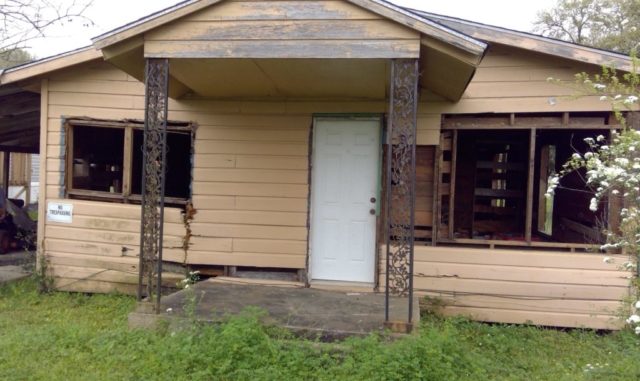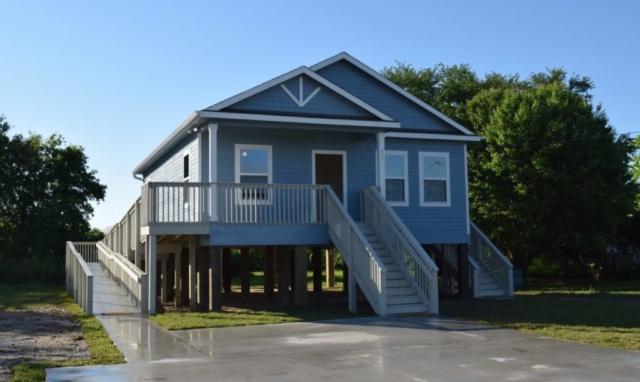When Havalisia Owens was a child, she used to spend summers with her grandparents at what eventually became her Port Arthur home. But when destruction done to the home by Hurricane Ike was finished by Tropical Storm Harvey’s flooding, she thought she was going to have to move from that land forever.
After months of waiting and working with state officials on eligibility, Owens has a new home to make memories with her own grandchildren and to provide a safe space — whether for family gatherings, during future storms or in other events.
“I cried this morning thinking about what my grandfather would think,” she said while exploring her new home for the first time Friday. Owens and her grandfather tried to work together to get a new home after Hurricane Ike but weren’t able to make it happen then.
“He would be so proud,” she continued. “I’m glad my family and I have a homestead for all the generations to come.”
The new two-bedroom, two-bathroom home — built in 15 days by JW Turner Construction — was funded by federal dollars administered by the Texas General Land Office through the Homeowner Assistance Program.
“We built this home for you, but you’re going to have to make it a home,” said J.W. Turner.
The HAP program aims to repair and reconstruct homes for area residents who lost their homes during Tropical Storm Harvey.
The GLO allocated $1 billion of federal disaster recovery funds to the program, which will go to 48 eligible counties, excluding the city of Houston. Money is awarded to eligible homeowners on first-come, first-serve basis.
Homes that require rebuilding, instead of simple repairs, cost between $100,000 and $150,000, said GLO spokeswoman Brittany Eck.
As of April 12, 2,824 applications for the program have been received from Hardin, Jefferson and Orange counties — the largest number out of the eligible sections of the state — according to the GLO. Of those, construction on 41 homes is underway.
Owens’ home was the first in Port Arthur to be completed. But there were times she thought she may never get to the end.
Early this year, Owens was informed by the GLO that she was ineligible for the full amount of funding for a new home because of what the federal government says qualifies as a misuse of an initial round of aid.
Eck said that’s not an uncommon issue the agency finds with storm victims. But it strives to work with residents to determine how they can be helped even with what’s called a duplication of benefits issue.
Eck said that can mean reducing the scope of the home or helping homeowners come up with ways to pay back the misused ais.
“If there are any issues with eligibility, we want folks to come talk with us anyway,” she said.
During that time and after FEMA took away her mobile home because Owens couldn’t afford rent the organization would be charging, she had to live with her daughter and two grandchildren in an apartment.
But the GLO worked with her to find a solution — reducing the scope of the home by taking it from three bedrooms to two and decreasing the size of the bedrooms.
But the home — raised some seven feet off the ground and easily the highest in her neighborhood — will work just fine, she said while holding her infant grandson on her hip and watching her 5-year-old grandson run from window to window, checking out the new view.
Owens said she plans to begin moving in after the Easter weekend with her uncle, who is older than her and has some mobility issues.
“My family is going to be so happy, I can cook now,” she said, planning smothered potatoes as the first food she’ll make in the new kitchen.
In addition to the home, JW Turner Construction provided Owens with a housewarming gift of various home cleaning supplies and tools. The program also pays for Owens’ homeowners, flood and wind insurance for the first year, Turner said.
Owens will then be required to maintain flood insurance to be eligible for any future flood assistance.
More info is available at Beaumont Enterprise










